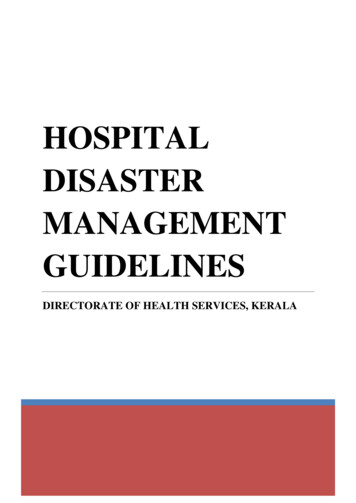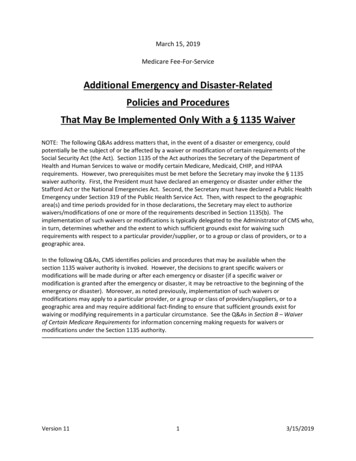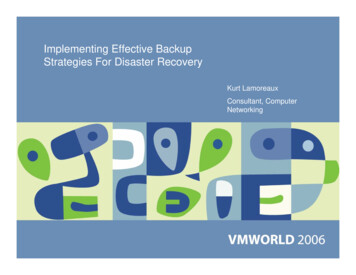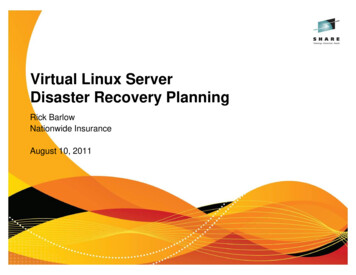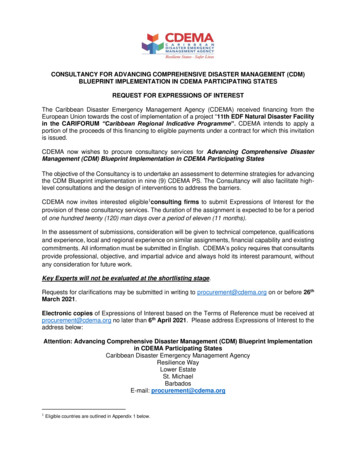
Transcription
CONSULTANCY FOR ADVANCING COMPREHENSIVE DISASTER MANAGEMENT (CDM)BLUEPRINT IMPLEMENTATION IN CDEMA PARTICIPATING STATESREQUEST FOR EXPRESSIONS OF INTERESTThe Caribbean Disaster Emergency Management Agency (CDEMA) received financing from theEuropean Union towards the cost of implementation of a project “11th EDF Natural Disaster Facilityin the CARIFORUM “Caribbean Regional Indicative Programme”. CDEMA intends to apply aportion of the proceeds of this financing to eligible payments under a contract for which this invitationis issued.CDEMA now wishes to procure consultancy services for Advancing Comprehensive DisasterManagement (CDM) Blueprint Implementation in CDEMA Participating StatesThe objective of the Consultancy is to undertake an assessment to determine strategies for advancingthe CDM Blueprint implementation in nine (9) CDEMA PS. The Consultancy will also facilitate highlevel consultations and the design of interventions to address the barriers.CDEMA now invites interested eligible1consulting firms to submit Expressions of Interest for theprovision of these consultancy services. The duration of the assignment is expected to be for a periodof one hundred twenty (120) man days over a period of eleven (11 months).In the assessment of submissions, consideration will be given to technical competence, qualificationsand experience, local and regional experience on similar assignments, financial capability and existingcommitments. All information must be submitted in English. CDEMA’s policy requires that consultantsprovide professional, objective, and impartial advice and always hold its interest paramount, withoutany consideration for future work.Key Experts will not be evaluated at the shortlisting stage.Requests for clarifications may be submitted in writing to procurement@cdema.org on or before 26thMarch 2021.Electronic copies of Expressions of Interest based on the Terms of Reference must be received atprocurement@cdema.org no later than 6th April 2021. Please address Expressions of Interest to theaddress below:Attention: Advancing Comprehensive Disaster Management (CDM) Blueprint Implementationin CDEMA Participating StatesCaribbean Disaster Emergency Management AgencyResilience WayLower EstateSt. MichaelBarbadosE-mail: procurement@cdema.org1Eligible countries are outlined in Appendix 1 below.
The selection method shall be Quality Cost Based Selection (QCBS). Following the assessment ofsubmissions, a short-list of not less than three (3) and not more than six (6) applicants will be providedwith full terms of reference and invited to submit technical and financial proposals to undertake theassignment.CDEMA reserves the right to accept or reject late applications or to cancel the present invitationpartially or in its entirety. CDEMA will not be bound to assign any reason for not selecting any applicantand will not defray any costs incurred by any applicant in the preparation and submission ofExpressions of Interest.
Appendix 1EUROPEAN UNION ELIGIBILITY RULESAFRICAN CARIBBEAN PACIFIC – EUROPEAN UNIONNATURAL DISASTER RISK MANAGEMENTPARTICIPATION IN PROCEDURES FOR THE AWARDING OFPROCUREMENT CONTRACTS OR GRANT CONTRACTS1.Participation in procedures for the award of procurement contracts financed under the EUContribution Agreement for the Implementation for the Action entitled: “Africa Caribbean Pacific –European Natural Disaster Risk Management in CARIFORUM Countries” (ACP – EU NDRM)”, is opento international organisations and all-natural persons who are nationals of, or legal persons who areestablished in, an eligible country.2.1Eligible countries are deemed to be:(a)2Members of the “African, Caribbean and Pacific (ACP) Group of States” :Africa:3South Africa , Angola, Benin, Botswana, Burkina Faso, Burundi, Central AfricanRepublic, Cameroon, Cape Verde, Chad, Comoros Islands, Congo, Côte d'Ivoire,Democratic Republic of the Congo, Djibouti, Eritrea, Ethiopia, Gabon, Gambia, Ghana,Guinea, Guinea-Bissau, Equatorial Guinea, Kenya, Lesotho, Liberia, Madagascar,Malawi, Mali, Mauritius, Mauritania, Mozambique, Namibia, Niger, Nigeria, Uganda,Rwanda, Sao Tome and Principe, Senegal, Seychelles, Sierra Leone, Somalia, Sudan,Swaziland, Tanzania, Togo, Zambia and Zimbabwe.Caribbean:Antigua and Barbuda, Bahamas, Barbados, Belize, Dominica, Dominican Republic,Grenada, Guyana, Haiti, Jamaica, Saint Kitts and Nevis, Saint Lucia, Saint Vincent and theGrenadines, Suriname, Trinidad and Tobago.12Note some countries may be eligible by virtue of more than one categoryCotonou Partnership Agreement of 23 June 2000 (as amended by the provisional application of Decision No 1/2000 of theACP-EC Council of Ministers of 27 July 2000, Decision No 1/2000 of the ACP-EC customs cooperation committee of 18October 2000, Decision No 1/2001 of the ACP-EC customs cooperation committee of 20 April 2001, Decision No 2/2001 ofthe ACP-EC customs cooperation committee of 20 April 2001, Decision No 3/2001 of the ACP-EC customs cooperationcommittee of 10 May 2001, Decision No 4/2001 of the ACP-EC customs cooperation committee of 27 June 2001, DecisionNo 5/2001 of the ACP-EC customs cooperation committee of 7 December 2001, Decision No 2/2002 of the ACP-EC customscooperation committee of 28 October 2002, Decision No 1/2003 of the ACP-EC Council of Ministers of 16 may 2003, CouncilDecision (EC) of 19 December 2002, Decision No 1/2004 of the ACP-EC Council of Ministers of 6 may 2004, Decision No2/2004 of the ACP - EC customs cooperation committee of 30 June 2004 and Decision No 4/2005 of the ACP-EC customscooperation committee of 13 April 2005).
3Natural and legal South African persons are eligible to participate in contracts financed by the 10th/11th EDF. However, the10th/11th EDF does not finance contracts in South Africa.Pacific:Cook Islands, East Timor, Fiji, Kiribati, Marshall Islands, Micronesia, Nauru, Niue,Palau, Papua New Guinea, the Solomon Islands, Western Samoa, Tonga, Tuvalu,Vanuatu.Overseas Countries and Territories:Anguilla, Antarctic, Netherlands Antilles, Aruba, British Indian Ocean Territory, BritishVirgin Islands, Cayman Islands, Falkland Islands (Malvinas), French Polynesia, FrenchSouthern Territories, Greenland, Mayotte, Montserrat, New Caledonia, Pitcairn, SaintHelena, Saint Pierre and Miquelon, South Georgia and South Sandwich Islands, Turksand Caicos, Wallis and Futuna Islands.(b)A Member State of the European Union:Austria, Belgium, Bulgaria, Croatia, Czech Republic, Cyprus, Denmark, Estonia,Finland, France, Germany, Greece, Hungary, Ireland, Italy, Latvia, Lithuania,Luxembourg, Malta, Netherlands, Poland, Portugal, Romania, Slovakia, Slovenia, Spain,Sweden.An official candidate country of the European Union:The Former Yugoslav Republic of Macedonia, Turkey, Iceland, Montenegro.A Member State of the European Economic Area: Iceland, Lichtenstein, Norway.(c)All natural persons who are nationals of, or legal persons who are established in, a LeastDeveloped Country as defined by the United Nations:Afghanistan, Angola, Bangladesh, Benin, Bhutan, Burkina Faso, Burundi, Cambodia,Central African Republic, Chad, Comoros, Dem. Rep. Congo, Equatorial Guinea, Eritrea,Ethiopia, Guinea, Guinea-Bissau, Haiti, Kiribati, Lao PDR, Lesotho, Liberia,Madagascar, Malawi, Mali, Mauritania, Mozambique, Myanmar, Nepal, Niger, Rwanda,Sao Tome and Principe, Senegal, Sierra Leone, Djibouti, Solomon Islands, Somalia,South Sudan, Sudan, Tanzania, The Gambia, Timor-Leste, Togo, Tuvalu, Uganda,Vanuatu, Yemen, Rep. and Zambia.(d)Participation in procedures for the award of procurement contracts or grants financedfrom the Facility shall be open to all-natural persons who are nationals of, or legalpersons established in, any country other than those referred to in paragraph 1, wherereciprocal access to external assistance has been established. Reciprocal access in theLeast Developed Countries as defined by the United Nations (UN) shall be automaticallygranted to the OECD/DAC members: Australia, Austria, Belgium, Canada, Denmark,Finland, France, Germany, Greece, Ireland, Italy, Japan, Korea, Luxembourg,
Netherlands, New Zealand, Norway, Portugal, Spain, Sweden, Switzerland, UnitedKingdom, United States.Caveat:The EU eligibility requirements are subject to change by the EU. The applicant isresponsible for checking whether there have been any updates on the eligibility requirements, as well asthe UN’s list of Least Developed Countries.
Appendix 2TERMS OF REFERENCEADVANCING CDM BLUEPRINT IMPLEMENTATION IN CDEMA PARTICIPATINGSTATES1. INTRODUCTIONThe Caribbean Disaster Emergency Management Agency (CDEMA) is the regional intergovernmentalagency established by the Heads of Government of the Caribbean Community (CARICOM) withresponsibility for disaster management. The work of the CDEMA System is guided by the RegionalComprehensive Disaster Management Strategy and Results Framework (CDM) 2014-2024. CDEMAParticipating States (PS) have adopted the regional CDM Framework as their roadmap towards the goalof safer, more resilient, and sustainable CDEMA Participating States. CDM is the management of allhazards through all phases of the disaster management cycle – prevention, mitigation, preparedness,response, recovery and rehabilitation – by all peoples – public and private sectors, all segments of civilsociety and the general population in hazard prone areas. It involves risk reduction & management andintegration of vulnerability assessment into the development planning process.Since 2010, CDEMA PS adopted a Blueprint that provides the conceptual framework needed for theeffective delivery of CDM at the national level. There are three components to the CDM Blueprint, policy,legislation, and country work programmes [PLC]. These are supported by tools for measuring change,national drivers for CDM implementation including political support, and appropriate National DisasterManagement Organisation structures; and national capacities for advancing CDM (See Annex 1).To assist PS with implementing the Blueprint the CDEMA Coordinating Unit (CU) with the support ofdevelopment partners, has provided technical assistance to PS, and has developed resources and tools insupport of this. Notwithstanding this, success with Blueprint advancement has been uneven. Factors thatseem to be contributing to this, include diverse implementation environments across the PS; the fact thatconsensus building and developing the necessary enabling environment takes time; the need forresources to advance and sustain CDM; and the need to develop a ‘new’ culture of reporting, monitoring,and evaluating. The CU is desirous of accelerating implementation of the CDM Blueprint. In this regard,under the Building the Resilience of the CARIFORUM States to Disaster Risks and Climate Change Impactsproject, which is financed by the European Development Fund, CDEMA is addressing capacity building formonitoring, evaluation and reporting and advancing [the] CDM Blueprint at the national level (Activity1.4).CDEMA is seeking a Consultancy to undertake an assessment to determine strategies for advancing theCDM Blueprint implementation in nine (9) CDEMA PS. The Consultancy will also facilitate high-level
consultations and the design of interventions to address the barriers. The consultancy seeks to answerthree main questions:1. What is the status of Blueprint advancement in CDEMA PS?2. What are the success factors and barriers to Blueprint advancement in CDEMA PS?3. What strategy, plan of action and specific interventions are needed to advance with the Blueprint?2. OBJECTIVES OF THE CONSULTANCYThe main objectives of the Consultancy are:2.1. To evaluate the 2010 Blueprint as the standard for advancing CDM implementation at thenational level and to determine any improvements needed.2.2. To evaluate the status of Blueprint implementation including an assessment of the barriers,opportunities, and good practice for advancement.2.3. To provide recommendations for advancing CDM Blueprint implementation in CDEMA PS.2.4. To assist nine PS (to be confirmed) in developing plans of actions and projects to implementrecommendations for advancing CDM Blueprint implementation2.2.5. To facilitate a virtual regional workshop targeting senior members of the National DisasterManagement Organisation to share findings and build capacity/ awareness on the requirementsfor advancing CDM Blueprint implementation.3. SCOPE OF WORKThe Consultancy will:3.1. Prepare an Inception Report3.1.1.Participate in an inception meeting with the CDEMA CU on the Terms of Reference andconfirm the scope of the work. The meeting will discuss objectives, activities, expectedoutputs and any issues related to the execution of the assignment that require clarification.3.1.2.Prepare and submit for CDEMA’s approval an Inception Report that details the approach tobe used in the execution of the Consultancy. The report should be prepared in accordancewith the CDEMA document, Guidelines for the Preparation of Consultants’ Reports/Updates; and should include:3.1.2.1. A review of relevant literature and documents aimed at providing anunderstanding of the context for the consultancy and that informs the approach tothe consultancy. This should include the following background documents fromCDEMA and other literature on advancing CDM implementation at the national level.a. CDM Strategy and Results Framework 2014-2024,2Seed funding is available through the Country Directed fund to support countries in implementing their strategiesand Plans of Actions.
b. Blueprint for advancing CDM at the National Level, 2010c. Supporting reports/ key related decisions from Meetings of the Council ofCDEMA including the Status of the Blueprint for implementing ComprehensiveDisaster Management at the national level, 2011d. CDM Blueprint Tools3.1.2.2. An evaluation of the 2010 Blueprint as the guideline for advancing CDMimplementation at the national level and any improvements needed based on goodpractice and the latest literature.3.1.2.3. The methodology for data collection and analysis.3.1.2.4. An annotated outline of the report at 3.2.3.1.2.5. A detailed work plan with timelines for completing the consultancy.3.1.3.Finalise the Inception Report to incorporate comments from CDEMA.3.2. Evaluate the status of Blueprint implementation and prepare a Report on the barriers,opportunities, best practice, and recommendations for advancing Blueprint implementation.3.2.1.Develop the instrument (s) / tool (s) to assess the status of CDM Blueprint implementationin line with the agreed methodology at 3.1 for CDEMA’s review and acceptance. These couldinclude online surveys, national consultations, and interviews with selected participants inidentified PS. The tools should also:3.2.1.1. Examine each area of the Blueprint.3.2.1.2. Assist in determining the nine countries for detailed evaluation and assistancewith Blueprint advancement at 3.3.3.2.1.3. Collect data for the partnership analysis on Blueprint advancement.3.2.2.Finalise the data collection instrument (s) at 3.2.1 based on feedback from CDEMA.3.2.3.Undertake data collection utilizing the tools at 3.2.2.3.2.4. Analyse the results of the data collected at 3.2.3 and prepare a report on the status ofBlueprint implementation in the CDEMA PS. The report should cover four main areas:3.2.4.1. Overall summary report on the status, success factors, barriers, opportunities,recommendations for Blueprint advancement in CDEMA PS and should take intoconsideration the findings at 3.1.3 concerning improvements to the Blueprint.3.2.4.2. Detailed reports for nine (9) selected PS on status, success factors, barriers,opportunities and recommendations for Blueprint advancement that includesfindings on partnership analysis for Blueprint advancement. Recommendationsshould be based on findings from the review, country context and good practice.3.2.4.3. Indicative costed plans of actions and projects for nine selected PS to implementrecommendations at 3.2.4.2 and for further development at national workshops.3.2.4.4. A case study on the experiences with emergencies and the challenges withlegislation.3.2.5.Submit the data collected at 3.2.3 and the report at 3.2.4 to CDEMA for review andacceptance.3.3. Present findings of the report for each country at 3.2 in nine national validation workshopsorganised by the NDMOs/ CDEMA; and codevelop strategies and costed plans of actions toadvance the recommendations.
3.3.1.Develop a concept note, facilitation plan, agenda, and tools for each national workshop forreview and acceptance by CDEMA.3.3.2. Facilitate national validation workshops (two-day workshops) for each country organisedby the National Disaster Management Office (NDMO) to:3.3.2.1.Review and validate the draft findings at 3.2.5 (status, barriers, opportunities andrecommendations for advancing Blueprint implementation).3.3.2.2. Review and codevelop costed plans of actions and projects to implementrecommendations to advance CDM Blueprint implementation.3.3.3.Prepare a workshop report for each country for review and acceptance by CDEMA. TheReport should include: A summary of the workshop, recommendations and an assessment of theachievement of workshop objectives; A workshop participants’ list including full contact information; All recommendations made by participants; Participant evaluations; Validated findings, recommendations and costed plans of action and projects.3.3.4.Finalise the report to incorporate feedback received from CDEMA.3.4. Finalise country reports, strategies and costed plans of action based on agreements at 3.3.3and submit to CDEMA for review and acceptance and revise as necessary.3.5. Facilitate a (virtual) regional capacity building workshop organized by CDEMA for seniormembers of the National Disaster Management Organisation to address Blueprintadvancement.3.5.1.Prepare a draft concept note for the regional workshop to share findings and build capacity/awareness on the requirements for advancing CDM Blueprint implementation. The conceptnote should include an annotation of the key areas for capacity building to be addressed inthe workshop.3.5.2.Submit the concept note (3.5.1) for review and acceptance by CDEMA and revise asnecessary.3.5.3.Develop the workshop agenda, facilitation plan and workshop tools, for review andacceptance by CDEMA.3.5.4.Assist with confirmation of the participants’ list.3.5.5.Facilitate the workshop.3.5.6.Prepare a report, for CDEMA’s review and acceptance, on the completion of the workshopthat includes:3.5.6.1. A summary of the workshop, recommendations and an assessment of theachievement of workshop objectives;3.5.6.2.A workshop participants’ list including full contact information;3.5.6.3.Participant evaluations/ feedback and recommendations.
3.5.7.Finalise the report to incorporate feedback received from CDEMA.3.6. Prepare an End of Consultancy Report which will include:3.6.1.Activities that were undertaken, results achieved (planned and unplanned), challenges,lessons learned and recommendations.3.6.2.Submit the Report to CDEMA for comments and revise, as necessary.4. RESULTS AND DELIVERABLESThe Consultancy will submit to the CDEMA CU for approval:4.1. An Inception Report at 3.1. to be submitted within two (2) weeks of signature of the contract.4.2. Data collection tools/ instruments at 3.2 to be submitted one week after the Inception Report.4.3. Data collected, and the draft report of the CDM Blueprint assessment at 3.2 to be submittedtwelve (12) weeks after the data collection tools. The final report will be submitted 2 weeksfollowing the national workshops at 3.3.4.4. Concept Note for national consultation workshops and material at 3.3.1 to be submitted twoweeks after the draft CDM Blueprint assessment report at 3.2.4.5. National Workshop Reports at 3.3.3 submitted three (3) weeks after the workshops.4.6. Final Strategies and costed Plans of action at 3.4 (5 weeks) after the workshops4.7. Regional capacity building workshop Concept Note and material at 3.5.1 and 3.5.3 to besubmitted two (2) weeks after final strategies and plans of action at 3.4.4.8. Regional workshop report at 3.5.6 submitted two (2) weeks after the workshop at 3.5.4.9. End of Consultancy Report at 3.6 to be submitted two (2) weeks after the regional workshopreport.5. REQUIREMENTS OF THE CONSULTANCYThe Consultancy shall possess the following minimum qualifications and competencies and shall presentfor consideration the minimum of two (2) experts for the undertaking of the work as outlined at Section3.0 above.QUALIFICATIONS OF THE FIRM (qualifications do not refer to combined experience):i.ii.iii.Seven (7) years of experience that includes the development and review of nationalassessments, national strategic policies, and development plans utilising participatoryapproaches.Proven experience in monitoring, evaluation, and reporting.Seven (7) years of experience in analysis, particularly the ability to design, conductresearch, analyse the findings, identify recommendations, and present reports fordecision making.
iv.v.vi.Extensive knowledge of disaster management, sustainable development and climatechange key issues, institutions, and actors is required.Experience working in the Caribbean region is an asset.Experience working with regional/international inter-governmental organizationsand national governments.The Consultancy Firm shall have experts with the following or equivalent qualifications.and experience:1. Disaster Management Experti. Master’s Degree in Disaster Risk Management, Geography, InternationalDevelopment, or a related field is required.ii. Seven (7) years of experience in Disaster Risk Management and related processes.iii. Excellent understanding of disaster risk reduction and related processes, keyissues, institutions, and actors involved in DRR in the Caribbean region.iv. Demonstrated experience in developing and implementing disaster riskmanagement and sustainable development programming.v. Demonstrated knowledge of the CDM Blueprint is a distinct asset.vi. Demonstrated experience in utilizing stakeholder participation techniques, andfacilitation of workshops with persons at decision-making levels is an advantage.vii. A good understanding of government operations and key stakeholders in theCaribbean is an advantage.viii. Proven experience in analysis and research in the field of policy and strategydevelopment, and implementation/management is required.2. Policy Experti. Master’s Degree in Policy Analysis/ International Development or a related fieldis required.ii. Seven (7) years of experience in Policy and Strategy Development andimplementation including monitoring and evaluation is required.iii. Proven experience working at a senior level on governance and public sectorissues.iv. Proven experience in working in a participatory and consultative environment.v. Demonstrated experience in national level programming (design andimplementation).vi. Experience in the development and review of strategic planning instruments.vii. Experience in working at the policy level of the public service in the Caribbeanregion will be a distinct advantage.
viii. Proven experience in analysis and research in the field of policy and strategydevelopment, and implementation/management is required.COMPETENCIES Professionalism: Expert level knowledge theories, concepts, and approaches related to policydesign, analysis, public sector governance, and strategic planning with excellent knowledge ofgovernance processes in Caribbean countries. Ability to identify issues, high impact actions, andrecommend solutions and approaches. Ability to listen and understand the perspectives ofvarious stakeholders and help them through the resolution of issues/problems. Ability toconduct data collection using various methods. Exercises discretion as required and is motivatedby professional rather than personal concerns; shows persistence when faced with difficultproblems or challenges; remains calm in stressful situations. Takes responsibility forincorporating gender perspectives and ensuring the equal participation of women and men in allareas of work. Planning & Organizing: Based on the supervision received from the CDEMA CU, plans work in amanner consistent with the goals and timeline of the project; allocates appropriate amount oftime for completing work; is conscientious and efficient in meeting commitments, observingdeadlines, and achieving results; foresees risks and allows for contingencies when planning;monitors and adjusts plans and actions as necessary; uses time efficiently. Accountability: Acts in full consultation and in compliance with instructions from the CDEMA CUand takes responsibility for agreed assignments; is accountable and trustworthy; honorscommitments by delivering outputs within the prescribed time, cost, and quality standards;operates in compliance with organizational regulations and rules; and takes personalresponsibility for his/her own shortcomings and shares successes with the team whereapplicable. Teamwork: Works collaboratively with colleagues to achieve organizational goals; is able tocoordinate effectively with other experts and team members by genuinely valuing others’ ideasand expertise and providing relevant inputs in tasks where others lead; is willing to learn fromothers; places team agenda before personal agenda; very good inter-personal skills and ademonstrated capacity to deal with colleagues and counterparts from different backgrounds,and proven ability to function in a multi-cultural and multi-ethnical environment with sensitivityand respect for diversity. Technological Awareness: Keeps abreast of technology development in the area related toonline meetings, surveys, communications; data processing, analysis, and presentation ofstrategic documents and result frameworks. Communication: Speaks and writes clearly and effectively; listens to others, correctly interpretsmessages from others and responds appropriately; asks questions to clarify, and exhibits
interest in having two-way communication; tailors language, tone, style, and format to matchaudience; demonstrates openness in sharing information and keeping people informed.6. CONSULTANCY SUPPORTCDEMA CU will:a. Provide background CDEMA/ Blueprint documentation as required.b. Provide comments on the draft documents submitted within ten (10) working days ofreceipt.c. Provide technical guidance for national-level consultations.d. Assist with the convening of a regional capacity building workshop.The NDMO will:a. Provide all administrative support, clear bottlenecks, and facilitate the work of theconsultant.b. Make available all supporting documentation that will be required for the success ofthe consultancy.c. Organise workshops, assist with the organisation of the national consultations,including the stakeholder engagement and partnership analysis.d. Provide timely constructive feedback on all products prepared by the consultant.7. Duration, Location, and Travel1. The Consultancy should be able to assume duties by June 2021.2. The duration of the consultancy is 120 days over an eleven (11) month period.3. The consultancy will be homebased and will include workshops in nine CDEMA PS. Theconsultancy may consider the use of a blended approach that would include the use of localconsultants to assist with the facilitation of the national workshops.4. The assignment will include virtual interactions for data collection, the facilitation of theregional workshop and other consultations as required related to the task assigned.
Figure 1: The CDM Blueprint
There are three components to the CDM Blueprint, policy, legislation, and country work programmes [PLC]. These are supported by tools for measuring change, national drivers for CDM implementation including political support, and appropriate National Disaster Management Organisation structures; and national capacities for advancing CDM (See .

